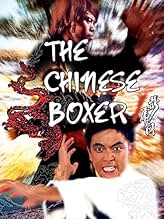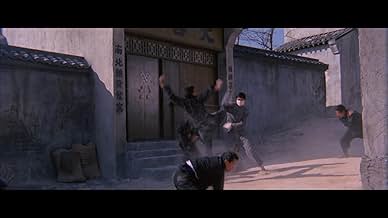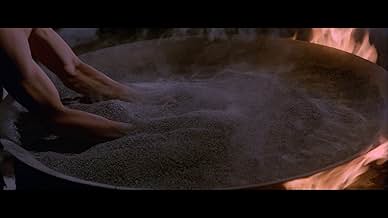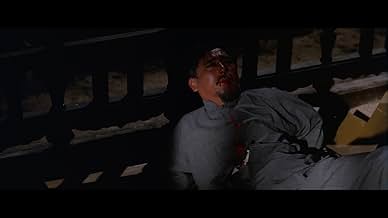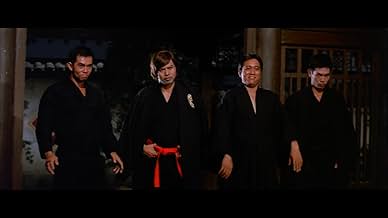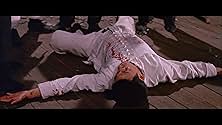IMDb-BEWERTUNG
6,8/10
988
IHRE BEWERTUNG
Füge eine Handlung in deiner Sprache hinzuA martial artist seeks revenge after his master and his entire Kwoon are wiped out by Japanese Karate masters who're in cahoots with a vile martial artist seeking to control the area by open... Alles lesenA martial artist seeks revenge after his master and his entire Kwoon are wiped out by Japanese Karate masters who're in cahoots with a vile martial artist seeking to control the area by opening casinos and trapping people in debt.A martial artist seeks revenge after his master and his entire Kwoon are wiped out by Japanese Karate masters who're in cahoots with a vile martial artist seeking to control the area by opening casinos and trapping people in debt.
Jimmy Wang Yu
- Lei Ming
- (as Yu Wang)
Lung Yu
- Greeting student
- (as Yu Chung Chieh)
Empfohlene Bewertungen
The Chinese Boxer, unsurprisingly bears some similarity to Jimmy Wang Yu's other popular franchises- The One Armed Swordsman and the One Armed Boxer. This time Jimmy takes on the baddies with both arms. It's a simple morality play, he's good, they're bad and after inflicting pain upon him, his family and his village, they're going to have to pay. What makes it so damn entertaining, is the style, and dare I say it, the passion that has gone into it. Ignore the bad dubbing (the Australian version has an atrocious British accented soundtrack) the panning and acanning, and sit back and enjoy a true classic of HK cinema. You'll also enjoy learning traditional Chinese medicine and philospohy in the manner with which it was intended. Take note of the traditional themes of Chinese cinema- Honour, family values, retribution. Listen for the quick sample of one of John Barry's Bond themes in some of the action sequences.
The most important fact about this movie: A Shaw Brothers movie written by, directed by, and starring Jimmy Wang Yu. That was the first and last time that ever happened.
It starts on a busy street in a small Chinese town. I think Shaw Brothers was just showing off that they could put together a throw away scene with hundreds of extras wandering a complete small town. So it really starts when our villain enters a kung fu school and criticizes them. He is a former student, kicked out for violence, and now a student of Japanese martial arts. Challenge accepted! He fights them but his moves do not resemble karate. During the opening credits one student runs, it seems to be about ten miles, to notify the master. He arrives first at a rock quarry where Jimmy Wang Yu and Cheng Lui seem to be working like slaves. They rush back to the school. Karate guy is now using judo. After introductions and rudeness the teacher arrives. They fight and teacher draws first blood. Karate/Judo guy vows to return with karate experts.
Cut to Jimmy Wang Yu walking and talking with his girl. She predicts a bad ending to all this karate versus kung fu business. Back at the school the master bores everyone with a lecture on the history of martial arts. Two important points are- the Chinese take credit as the originators of all martial arts and the Iron Palm and Light Leaping techniques can defeat karate. Remember that, there will be a one question test at the end of the movie. "How do you defeat karate?"
What follows is then the first training sequence. Jimmy engaged in many exercises to show the physical demands required to gain martial arts proficiency. In reality this is a redundant and mind numbing process so the movies had to make it look more interesting.
Lo Lieh plays an absolute bad guy in this movie. He is one of the few leading men who had real martial arts experience before he started acting. His career began with hero roles but subsequently turned to villains. He is probably better remembered as a villain. His background was in karate so was a perfect fit for this role. Chan Sing is another villain in this movie. He also has a background in Goju-Ryu karate. I am unable to verify of this is before, after, or during his acting career. He fights Jimmy at about 30 minutes into the movie and most of the fight choreography is actually karate for the first time in this movie. He takes out Jimmy with a hit to the forehead.
This movie has my highest recommendation which is underwhelming because it is a landmark film that had social and cultural influence beyond the movie world and is mandatory viewing for any fan of this genre.
It starts on a busy street in a small Chinese town. I think Shaw Brothers was just showing off that they could put together a throw away scene with hundreds of extras wandering a complete small town. So it really starts when our villain enters a kung fu school and criticizes them. He is a former student, kicked out for violence, and now a student of Japanese martial arts. Challenge accepted! He fights them but his moves do not resemble karate. During the opening credits one student runs, it seems to be about ten miles, to notify the master. He arrives first at a rock quarry where Jimmy Wang Yu and Cheng Lui seem to be working like slaves. They rush back to the school. Karate guy is now using judo. After introductions and rudeness the teacher arrives. They fight and teacher draws first blood. Karate/Judo guy vows to return with karate experts.
Cut to Jimmy Wang Yu walking and talking with his girl. She predicts a bad ending to all this karate versus kung fu business. Back at the school the master bores everyone with a lecture on the history of martial arts. Two important points are- the Chinese take credit as the originators of all martial arts and the Iron Palm and Light Leaping techniques can defeat karate. Remember that, there will be a one question test at the end of the movie. "How do you defeat karate?"
What follows is then the first training sequence. Jimmy engaged in many exercises to show the physical demands required to gain martial arts proficiency. In reality this is a redundant and mind numbing process so the movies had to make it look more interesting.
Lo Lieh plays an absolute bad guy in this movie. He is one of the few leading men who had real martial arts experience before he started acting. His career began with hero roles but subsequently turned to villains. He is probably better remembered as a villain. His background was in karate so was a perfect fit for this role. Chan Sing is another villain in this movie. He also has a background in Goju-Ryu karate. I am unable to verify of this is before, after, or during his acting career. He fights Jimmy at about 30 minutes into the movie and most of the fight choreography is actually karate for the first time in this movie. He takes out Jimmy with a hit to the forehead.
This movie has my highest recommendation which is underwhelming because it is a landmark film that had social and cultural influence beyond the movie world and is mandatory viewing for any fan of this genre.
For fans of Lo Lieh (Five Fingers of Death) this is a chance to see him as the evil Japanese karate master. In the US, advertising hyped this as "the most blood-spurting" martial arts film. It's hardly that; but the fight scenes are wild.
Jimmy Wang Yu, an authentic Asian superstar, directed and wrote this film which I have only seen in a dubbed videotape version. The widescreen (Shaw Scope!)shape was lost and the original actor's voices absent but this is still good to watch. The story is the usual martial arts school fights villains from Japan plot with our young hero winning out in the end by beating up loads of assorted thugs.
The combat gets better as the film unravels. Early in the film it looks stiff and dull but later there is a great scene where Wang Yu fights hordes in a gambling joint then walks out into a snowy scene and takes some more villains on with knives, sword and fists. That part is very exciting.
Quite good then but it would be interesting to see a non dubbed widescreen version if there is one.
The combat gets better as the film unravels. Early in the film it looks stiff and dull but later there is a great scene where Wang Yu fights hordes in a gambling joint then walks out into a snowy scene and takes some more villains on with knives, sword and fists. That part is very exciting.
Quite good then but it would be interesting to see a non dubbed widescreen version if there is one.
The late, great Jimmy Wang Yu wrote, directed, and starred in this martial arts classic with an appreciably simple, straightforward story. A swaggering heel named Diao Erh-yeh (Hsiung Chao) comes to a school of Chinese boxing to throw his weight around. But the wise teacher (Mien Fang) sends him packing. Soon, the villain has returned with brutal karate fighters from Japan, and they slaughter almost everybody in the school. But our hero survives, and spends time recuperating and training for what he knows is going to be a tough quest for revenge.
This viewer would agree that "The Chinese Boxer" only gets better as it goes along. The fighting is top-notch, of course, and the film has a definite energy and flow to it. It's also quite amusingly violent, with a lot of bright red movie blood oozing from various mortal wounds. Our hero, Lei Ming, is a calm, steady, soft-spoken type, and the villains are absolutely classic in their unsubtle nastiness. (To add insult to injury, Diao Erh-yeh takes over the whole town, turning it into a hotbed of corruption.) Best of all is when the climactic action is taken outside, and our opponents start tangling in the snowy wilderness. But the training scenes are also as cool as can be, as Lei Ming learns to practice "weightlessness" and creates "hands of iron". Interestingly, in this saga, karate is portrayed in a largely negative way, with the teacher explaining the difference between karate and Chinese boxing to his students.
The music is good, the widescreen photography excellent, and the cast solid; this viewer did watch the English-language version, but the dubbing really didn't bother him that much. Overall, this is quite engaging, and clearly influenced later films such as Quentin Tarantinos' "Kill Bill" saga.
Eight out of 10.
This viewer would agree that "The Chinese Boxer" only gets better as it goes along. The fighting is top-notch, of course, and the film has a definite energy and flow to it. It's also quite amusingly violent, with a lot of bright red movie blood oozing from various mortal wounds. Our hero, Lei Ming, is a calm, steady, soft-spoken type, and the villains are absolutely classic in their unsubtle nastiness. (To add insult to injury, Diao Erh-yeh takes over the whole town, turning it into a hotbed of corruption.) Best of all is when the climactic action is taken outside, and our opponents start tangling in the snowy wilderness. But the training scenes are also as cool as can be, as Lei Ming learns to practice "weightlessness" and creates "hands of iron". Interestingly, in this saga, karate is portrayed in a largely negative way, with the teacher explaining the difference between karate and Chinese boxing to his students.
The music is good, the widescreen photography excellent, and the cast solid; this viewer did watch the English-language version, but the dubbing really didn't bother him that much. Overall, this is quite engaging, and clearly influenced later films such as Quentin Tarantinos' "Kill Bill" saga.
Eight out of 10.
Wusstest du schon
- WissenswertesThis is the first chinese martial arts movie where they dont fight with swords but rather with hands
- Alternative VersionenUK video versions were cut by 1 min 3 secs by the BBFC to edit lethal body blows and to heavily reduce the rape scene.
- VerbindungenFeatured in Trailer Trauma Part 4: Television Trauma (2017)
Top-Auswahl
Melde dich zum Bewerten an und greife auf die Watchlist für personalisierte Empfehlungen zu.
- How long is The Hammer of God?Powered by Alexa
Details
- Laufzeit1 Stunde 27 Minuten
- Sound-Mix
- Seitenverhältnis
- 2.35 : 1
Zu dieser Seite beitragen
Bearbeitung vorschlagen oder fehlenden Inhalt hinzufügen

Oberste Lücke
By what name was Wang Yu - Sein Schlag war tödlich (1970) officially released in India in English?
Antwort
